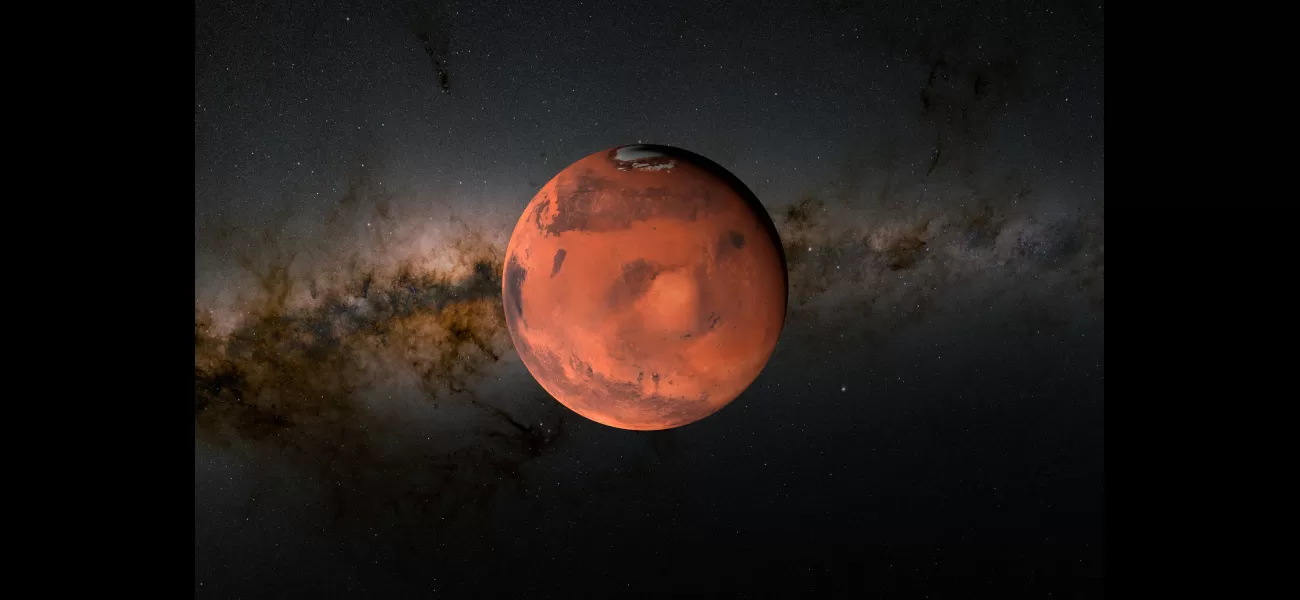Harmful microbes may hinder initial human presence on Mars.
It's already hard enough.
February 6th 2024.

In the not-too-distant future, it is highly likely that humans will set foot on the red planet, Mars. However, this exciting prospect just got a little more complicated. According to a recent study, it seems that some pesky bacteria may be hitching a ride with us on our journey to this distant world.
The study suggests that these bacteria, which are known to cause diseases in humans, could actually thrive in the harsh conditions found on Mars. This poses a potential problem for future missions, as these bacteria could mutate in the Martian environment and potentially re-infect the humans who brought them there in the first place.
One major concern is how human immune systems will cope with these infections on Mars. As we know, spaceflight can cause our immune systems to become stressed and dysregulated. And let's not forget that Mars is a long way from the nearest hospital, which adds even more uncertainty to the situation.
The study, published in the journal Astrobiology, conducted an experiment where four common disease-causing microbes were placed in a simulated Mars environment. Despite the lack of water, low atmospheric pressure, and high levels of ultraviolet and toxic salts, these bacteria managed to stay alive for varying periods of time, with some even growing in the harsh conditions.
These microbes were specifically chosen because they are usually harmless to humans but can become harmful when they are stressed. Previous studies have also shown that some bacterial species found on the human body can survive on meteorites, raising questions about their potential survival on Mars.
Led by microbiologist Tommaso Zaccaria, the research team placed colonies of Burkholderia cepacia, Klebsiella pneumoniae, Pseudomonas aeruginosa, and Serratia marcescens in an environment that simulated the Martian regolith, or loose surface material. Initially, the scientists believed that the Martian surface would kill off the bacteria, but they were surprised to find that the opposite happened.
Speaking to Science News, Mr. Zaccaria explained, "At the beginning, we thought that the regolith would have a toxic effect on the cells so it would limit their growth. But instead, we saw that it was the opposite."
Three of the species managed to survive in this simulated environment, with P. aeruginosa even growing steadily for 21 days. However, the researchers are still unsure how this particular microbe was able to survive for so long.
This discovery poses not only potential health concerns for future human missions to Mars but also raises questions about how we will be able to distinguish between Earthly bacteria and any potential signs of life on the red planet. As microbiologist Samantha Waters, who was not involved in the study, pointed out, "When humans finally land on Mars, they will need to be sure they're not confusing bacteria brought on their shoe for proof of life on the planet. If Earthly organisms can survive, that will become more tricky."
Despite these challenges, microbiologist Samantha Waters believes that these issues should not deter us from exploring our solar system further. She believes that the pursuit of knowledge and discovery will ultimately lead to great findings and valuable historical insights.
In the end, it is essential to remember that we have already made significant progress in understanding and exploring Mars, even though there is still so much that we do not know. For instance, we have already littered the planet with space junk, and a mysterious blue orb has been spotted by NASA's rover. And let's not forget about the unfortunate end of NASA's $85 million Mars toy, whose mission is officially over.
But despite these setbacks and unanswered questions, it is clear that humans will continue to push the boundaries of space exploration and embark on incredible journeys to distant worlds. As we move forward, we must also be mindful of the potential risks and challenges that may arise and proceed with caution and careful consideration.
The study suggests that these bacteria, which are known to cause diseases in humans, could actually thrive in the harsh conditions found on Mars. This poses a potential problem for future missions, as these bacteria could mutate in the Martian environment and potentially re-infect the humans who brought them there in the first place.
One major concern is how human immune systems will cope with these infections on Mars. As we know, spaceflight can cause our immune systems to become stressed and dysregulated. And let's not forget that Mars is a long way from the nearest hospital, which adds even more uncertainty to the situation.
The study, published in the journal Astrobiology, conducted an experiment where four common disease-causing microbes were placed in a simulated Mars environment. Despite the lack of water, low atmospheric pressure, and high levels of ultraviolet and toxic salts, these bacteria managed to stay alive for varying periods of time, with some even growing in the harsh conditions.
These microbes were specifically chosen because they are usually harmless to humans but can become harmful when they are stressed. Previous studies have also shown that some bacterial species found on the human body can survive on meteorites, raising questions about their potential survival on Mars.
Led by microbiologist Tommaso Zaccaria, the research team placed colonies of Burkholderia cepacia, Klebsiella pneumoniae, Pseudomonas aeruginosa, and Serratia marcescens in an environment that simulated the Martian regolith, or loose surface material. Initially, the scientists believed that the Martian surface would kill off the bacteria, but they were surprised to find that the opposite happened.
Speaking to Science News, Mr. Zaccaria explained, "At the beginning, we thought that the regolith would have a toxic effect on the cells so it would limit their growth. But instead, we saw that it was the opposite."
Three of the species managed to survive in this simulated environment, with P. aeruginosa even growing steadily for 21 days. However, the researchers are still unsure how this particular microbe was able to survive for so long.
This discovery poses not only potential health concerns for future human missions to Mars but also raises questions about how we will be able to distinguish between Earthly bacteria and any potential signs of life on the red planet. As microbiologist Samantha Waters, who was not involved in the study, pointed out, "When humans finally land on Mars, they will need to be sure they're not confusing bacteria brought on their shoe for proof of life on the planet. If Earthly organisms can survive, that will become more tricky."
Despite these challenges, microbiologist Samantha Waters believes that these issues should not deter us from exploring our solar system further. She believes that the pursuit of knowledge and discovery will ultimately lead to great findings and valuable historical insights.
In the end, it is essential to remember that we have already made significant progress in understanding and exploring Mars, even though there is still so much that we do not know. For instance, we have already littered the planet with space junk, and a mysterious blue orb has been spotted by NASA's rover. And let's not forget about the unfortunate end of NASA's $85 million Mars toy, whose mission is officially over.
But despite these setbacks and unanswered questions, it is clear that humans will continue to push the boundaries of space exploration and embark on incredible journeys to distant worlds. As we move forward, we must also be mindful of the potential risks and challenges that may arise and proceed with caution and careful consideration.
[This article has been trending online recently and has been generated with AI. Your feed is customized.]
[Generative AI is experimental.]
0
0
Submit Comment





